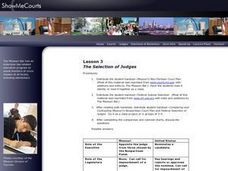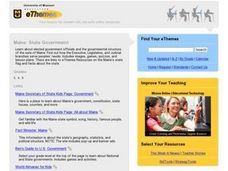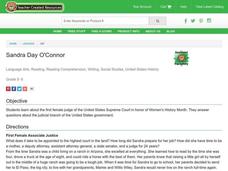Curated OER
Geography of the Hill
Middle schoolers explore the basic functions of Canadian government, who is responsible for each function and where the officials associated with each function work.
Curated OER
The Selection of Judges
Students analyze documents to determine the steps taken in the selection of judges.
Carolina K-12
Principles of the US Constitution
After breaking into groups according to major principles of government (i.e., popular sovereignty, separation of powers, checks and balances, etc.) in the United States, your class members will produce public service announcements...
Curated OER
Government Lesson Plan: Lesson Plan 5
Students identify the process of writing a case brief. They analyze the case McCulloch v Maryland. After a lecture/demo, students utilize a case study worksheet imbedded in this plan to help them explain the process of performing a case...
Curated OER
Read My Lips
Learners research and examine Florida's government and the three branches of government. They write and present campaign speeches that explain the reasons why they would be the best candidates for governor.
Curated OER
THE JUDICIAL BRANCH
Students create a series of drawings to show the process of how the Supreme Court does its work. The drawings may be in strip cartoon form or a series of separate illustrations.
Curated OER
Order in the Court
Learners identify the branches of government, who leads each branch and its responsibilities. They understand the role that John Marshall played in our government system. They research the role of the Supreme Court.
iCivics
The Road to Civil Rights
Here is a fantastic resource on the civil rights movement! It includes reading materials and worksheets, and particularly highlights major legislation and the role of the judicial branch in the federal government in addressing the...
Curated OER
How the Supreme Court Affects the Lives of Teens
Students describe the structure and function of the United States Supreme Court. They examine and analyze decisions made by the Court. They participate in a debate about recent issues.
Curated OER
3 Branches of Governement
Sixth graders use the "Making the Grade" books, citizenship packets, and the "Ben's Guide" website to create a poster and a report on their assigned government branch. They then present their poster and report to their classmates.
Curated OER
Maine: State Government
Young scholars participate in interactive lessons to study the history and government of Maine. They observe the studenT Cabinet of Maine and assess its goals and work.
Curated OER
Supreme Court Decisions on Freedom of Religion
What does freedom of religion mean? Analyze a series of Supreme Court cases where the First Amendment right to freedom of religion was put to the test. They discuss the cases' outcomes and argue whether the right decision was made....
Curated OER
Constitutional Issues: Watergate and the Constitution
Students take and defend positions on what conditions contribute to the establishment and maintenance of a constitutional government. They debate whether or not the government should have prosecuted Nixon over the Watergate scandal.
Curated OER
Sandra Day O'Connor
No unit on important women in history would be complete without a activity on Sandra Day O'Connor. After reading background information about the first female Supreme Court justice, middle schoolers engage in several activities...
Curated OER
Woodrow The White House Mouse
Inauguration Day is January 20. Implement an entire week's worth of mini activities to help young historians become knowledgeable of the President's job, the executive branch, and the White House. The worksheets focus on research skills,...
State Bar of Texas
Marbury v. Madison
Who has the final say in matters dealing with the rules under the United States Constitution? The case Marbury v. Madison brings to light the issue of judicial review. Learners investigate the Supreme Court's opinion in the case with a...
Curated OER
Zen and the Art of Murder
Students describe the importance of citizen involvement in the judicial system. They play the role of a witness to a crime scene by watching the video clip. Students discuss how differing eyewitness accounts can affect a police...
Curated OER
Marriage Equality: Different Strategies for Attaining Equal Rights
Students examine gays rights issues in the United States. In this gay marriage lesson, students investigate how people have made their cases before the executive, legislative, and judicial branches of government to secure their civil...
Curated OER
I'm Just a Bill
Fourth graders study the three branches of government and the process of how a bill becomes a law. They watch the School House Rock video "I'm Just a Bill" and sing the song after viewing the video. They answer question regarding a bill...
Curated OER
Michigan Judicial System Conclusion
Students identify the courts that make up Michigan's judicial system. They state the responsibilities of each court and diagram a flow chart of how a case moves to the Michigan Supreme Court. They participate in a quiz about the current...
Ohio Center For Law-Related Education
Four Activities: Thurgood Marshall and the Nomination and Confirmation of Federal Judges
The process of nominating and confirming federal judges can sound like a lot of bureaucratic hoops, but a resource breaks down the steps of the Supreme Court nominations in a simpler manner. Learners participate in four activities that...
Curated OER
Checks and Balances in Supreme Court Nominations
Learners discover the system of Checks and Balances related to recent events prompting action by one or more of the three branches of government. They study the process for selecting and confirming a Supreme Court justice. They examine...
Curated OER
U.S. Constitution - Checks and Balances
Students examine the separation of powers of the branches of the U.S. federal government. In this U.S. Constitution lesson, students listen to a SMART Board supported lecture on checks and balances of the Judicial, Legislative, and...
Curated OER
American History Through the Len of the Supreme Court Decisions
Students examine the historical background of Supreme Court decisions and the basic principles behind legislation. As part of the lesson, students discover legal concepts and terms and write sentences using the vocabulary they have...

























